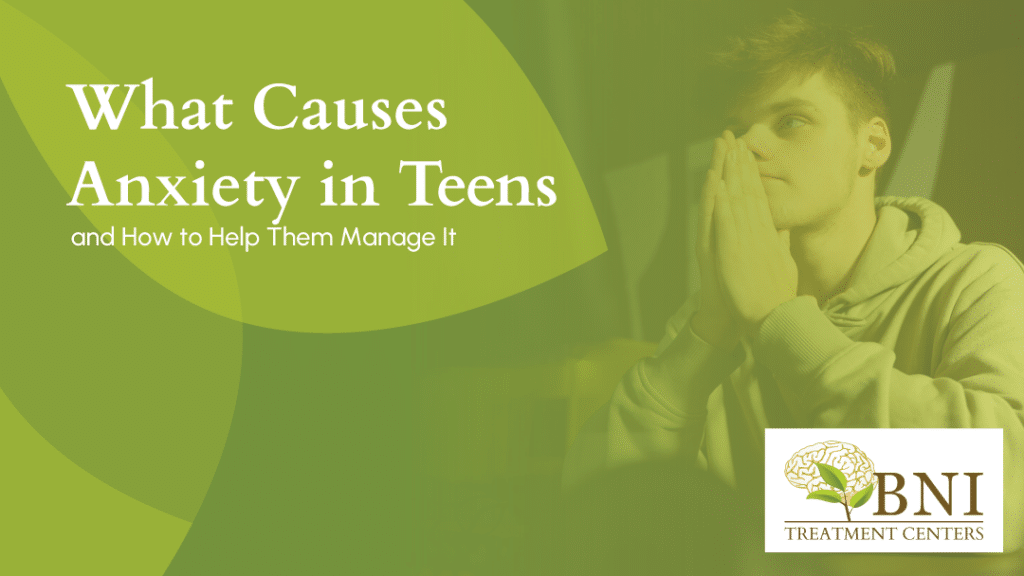As of 2023, 58% of California’s youth report experiencing anxiety on a regular basis. It is one of the most common mental health conditions in …
What Causes Anxiety in Teens and How to Help Them Manage It

As of 2023, 58% of California’s youth report experiencing anxiety on a regular basis. It is one of the most common mental health conditions in adolescents. But why?
At BNI Treatment Centers, our team of psychiatrists is well-acquainted with teen anxiety disorders. Our team works to carefully develop the treatment plans for our clients and empower them to live lives free from worry.
But what causes anxiety in teens? We’ll answer that and more in today’s blog.
The Rising Trend of Teen Anxiety: Understanding Anxiety in Teens
In 2007, 5.5% of American youth ages 6-17 were diagnosed with anxiety, compared to 6.4% in 2011-2012. By 2016, these numbers were up to 7.1%, and by 2020, 9.2% were diagnosed with an anxiety disorder.
This is a concern for today’s adolescents, and it continues to be a growing problem.
Possible Causes of Anxiety in Teens
There are many potential reasons a teen might develop an anxiety disorder. Common factors include hormonal changes, academic pressure, concerns with their social life or body image, and worries about the future. While years of perspective can make teenage concerns seem trivial, it’s important to remember that teenage emotions are just as genuine and intense as adult emotions – sometimes even more so!
Hormonal Changes
Teenagers go through significant hormonal changes during puberty. One hormone, allopregnanolone (THP), assists with calming the brain in adults and young children. In adolescents, however, THP has the opposite effect. The brain becomes excited, which can lead to anxiety.
Changes in the sex hormones estrogen, progesterone, and testosterone also contribute to teenage mood swings, including bursts of anxiety. Cycling ovarian hormones are proven to change brain activity, so adolescents who menstruate may face additional challenges.
Academic Life
Students sometimes face extreme pressure to perform well in school, often perpetuated by parents, friends, and school officials. They may think they need to have perfect grades to find success. Students are often busy with schoolwork and after-school activities, which can leave little room for relaxation – this persistent build-up of stress can result in anxiety.
Social Life
Many teens prioritize popularity, and sometimes they focus on what people think of them over their own well-being. Teens may be anxious about friends thinking they’re cool, or the person they like returning their feelings, among other social factors. These feelings of general social anxiety can play large roles in the development of anxiety disorders.
Body Image
Adolescence is a time when teenagers experience significant physical changes. Teens may feel insecure about a certain aesthetic trait, and experience anxiety because of it. They may worry others look down on them, or that they will never be comfortable with their own body.
Anxiety About the Future
Only 47% of Gen Z rate their imagined future an eight out of ten or higher. Less than half of young people believe their futures are bright. Many teens worry if college is attainable, about getting a job afterward, or falling in love. Many teens find these wishes unrealistic, and frequent access to negative media only makes teens feel more pessimistic than ever.

Types of Anxiety, and When It’s Cause for Concern
Most people experience some form of anxiety. It’s normal to worry about things sometimes, and occasionally feel stressed or afraid. However, anxiety becomes a concern when it lasts for a long time, is overly intense, or interferes with a teen’s daily life.
Stress or an Anxiety Disorder?
Stress is unpleasant, but it’s natural. Both teens and adults often feel stressed when they have too many things to manage. The difference between stress and an anxiety disorder is that when the stressor is taken away, the stress goes with it. With anxiety disorders, the anxiety and stress continue, whether the stressor is there or not.
Fear or an Anxiety Disorder?
Fear is a response by our body that helps us react appropriately to danger. Sometimes, people fear dangers that are ultimately harmless. No matter the reason, fear will typically go away after the frightening event. Individuals with an anxiety disorder instead continue to feel that fear long after the event has passed, and may excessively worry about it happening again.
Social Anxiety
This is anxiety related to interacting with other people. Teens with social anxiety will rarely speak because they are afraid of being perceived negatively. They worry that others will make fun of them, or dislike them, or even hate them – and this worry persists no matter what they say. Social anxiety is usually present with every social interaction, even with people the individual is more comfortable with. In some cases, social anxiety can be serious enough for teens to begin avoiding social situations altogether.
A closely related – though distinct – form of anxiety is that of “selective mutism”. With selective mutism, individuals are able to speak and act freely in some social contexts, such as being at home with family, but completely become silent and nonverbal in others, such as at school with classmates.
Separation Anxiety
Separation anxiety is most common in young children. It consists of anxiety when the individual with it can’t be without someone else, often a parent, but sometimes a small toy or blanket. Those with separation anxiety will worry the absent person they care for will never return, or that something will happen to them while they’re away.
Signs of Teen Anxiety: Emotional and Behavioral Changes
There are many symptoms of anxiety, and it manifests differently in every teen. However, there are still common signs, including:
- Persistent worry
- Trouble concentrating
- Sensitivity to criticism
- Insecurity
- Withdrawal from social activities
- Avoidance of new situations
- Frequent headaches or stomach problems
- Dropping grades or refusing to go to school
- Often seeking reassurance
- Trouble sleeping
- Substance use
Mental Wellness for Teens: How to Help
Mental wellness approaches can help teens find some relief from anxiety. Encourage them to talk about their feelings and ask for help when needed. Work with them to eat nutrient-rich foods, exercise regularly, and get enough sleep. Help your teen build healthy coping mechanisms and find outlets for their anxiety. Teach them strategies to help them calm down, like meditation or breathing exercises. Support your adolescent consistently, be patient with them, and above all work to actively listen and treat them with respect.

Adolescent Anxiety Treatment in Los Angeles, CA
If none of the above recommendations help, it may be time to seek mental health care for your teenager. There is effective, comprehensive anxiety treatment for teens available.
BNI Treatment Centers works with teens ages 12-17 to overcome their anxiety, and any other mental health conditions they may experience. Our small, intimate facility allows for attentive, individualized care for every adolescent. For more information, call us at (888) 522-1504.
BNI Treatment Centers: Science-based, evidence-backed, compassion-led.
FAQs
What are 3 coping strategies for anxiety?
Focusing on activities you enjoy, meditation, and journaling are three strategies for managing anxiety.




